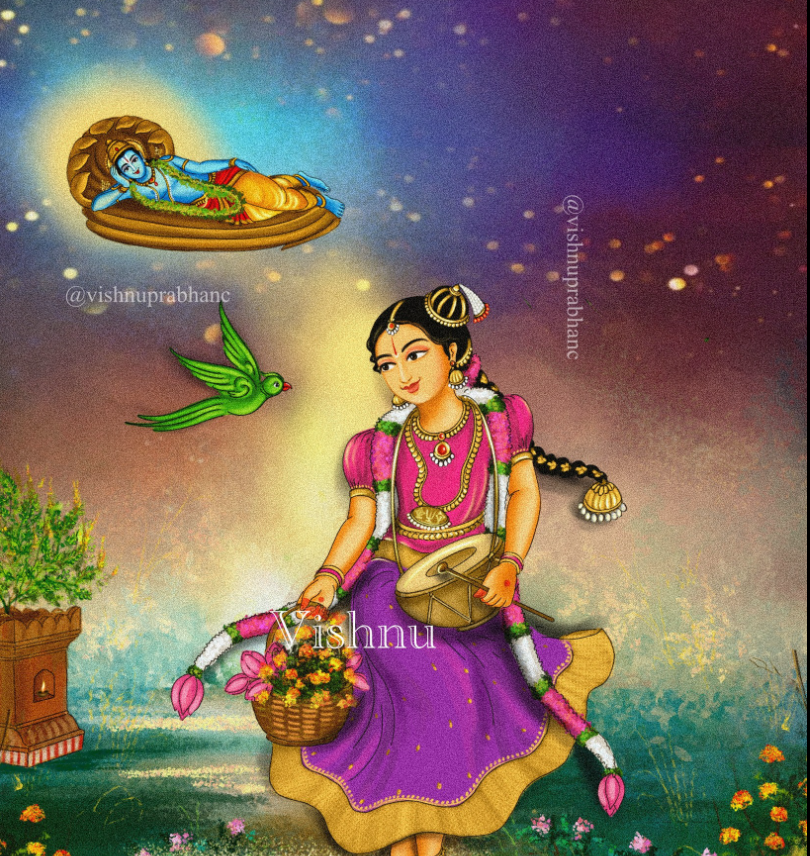Vedanta
Understanding Thirupavai Pasuram 20: A Call for Divine Grace
Thirupavai, a sacred collection of 30 hymns by the revered saint-poetess Andal, is a beautiful representation of devotion, surrender, and the power of divine grace. Composed in Tamil, these verses offer a profound reflection on the importance of seeking Lord Vishnu's blessings with unwavering faith and devotion. Pasuram 20, like many others in this collection, is an intense prayer for divine intervention, expressing both the devotee's longing for salvation and their recognition of Lord Vishnu’s infinite grace. Let’s dive deeper into the meaning and essence of Pasuram 20, where Andal beautifully conveys her devotion and her desire for liberation (Moksha) through Lord Vishnu’s mercy.
Madhavi Marri
1/12/20253 min read


Pasuram 20: Translation & Meaning
Pasuram (20):
உருவம் விரைஞ்சி உண்டார் உண்டாதே
அருவமுதல் கொள்வர் புகலிடத்தி னதிலே
பரவமதில் பலியனைக் கையால் தந்தால்
பெருவினை யாரும் பரிசொல் படுவீர்
Transliteration:
Uruvam virainchi undaarku undaadhe
Arivamudhal kolvar pukalidaththiladhe
Paravadhil thaliyanai kaiyaal thandhaal
Peruvinai yaarum parisol paduveer
Breaking Down the Meaning
In this Pasuram, Andal beautifully combines the themes of surrender, grace, and the ultimate goal of liberation (Moksha). Let’s break down the key messages in this verse:
"Uruvam virainchi undaarku undaadhe"
This phrase refers to those who are fortunate enough to have the physical form to engage in rituals or actions of devotion. Andal expresses how having a human form is rare, and it is a privilege to serve the Lord through one's actions. It’s also an indirect reference to the idea that not everyone makes use of this divine gift of life in a way that can lead to salvation."Arivamudhal kolvar pukalidaththiladhe"
Here, Andal emphasizes that the actions of offering devotion and seeking blessings must start with a pure, sincere heart. The true pursuit of the divine can never be superficial or selfish. It must arise from genuine surrender, a willingness to give up the ego, and an understanding of the Lord’s boundless grace."Paravadhil thaliyanai kaiyaal thandhaal"
Andal speaks about the power of offering one's hands to serve the Lord. It can be interpreted as a metaphor for surrendering all one’s actions and duties to God. In Hindu tradition, "paravadhil" refers to a grand offering, an ultimate sacrifice or service to the Lord. Through this service, the devotee hopes to receive divine grace."Peruvinai yaarum parisol paduveer"
The final line highlights the central message of this Pasuram: no matter how great the sins or karmas one carries, the Lord’s grace can cleanse it all. Here, Andal assures that no soul is beyond redemption. Regardless of the burden of past actions (sins or misdeeds), those who seek refuge in the divine will be forgiven and granted the ultimate reward – liberation.
The Essence of Pasuram 20
At its core, Pasuram 20 reflects the power of complete surrender and devotion to Lord Vishnu. Andal urges her devotees to offer their actions to the Lord, understanding that it is only through divine grace that one can be relieved from the cycle of birth and death (samsara). She also emphasizes that the human form is a precious opportunity to seek God, as it is the only form that can perform acts of devotion and service, which lead to salvation.
Through the words of this Pasuram, Andal reminds us that while worldly actions may seem significant, it is ultimately the spiritual actions—those performed in surrender to the divine—that carry the most weight. Even the heaviest of sins or karmic burdens can be cleansed by the grace of God, making liberation achievable for all who truly seek it.
The Role of Divine Grace in Liberation
A key message in this Pasuram is the understanding that divine grace is the ultimate liberator. While human effort is important in following the path of devotion and righteousness, it is Lord Vishnu’s mercy that purifies the soul and grants salvation. This aligns with the core philosophy of many Hindu texts, where the Supreme Being is seen as both the source of creation and the ultimate force of redemption.
In this context, Andal’s prayer reflects her deep yearning for that grace, which she knows will remove all obstacles to Moksha. The simplicity of the prayer contrasts with the grandeur of the grace sought, demonstrating Andal’s complete faith in the Lord’s ability to deliver the soul from suffering.
Conclusion: A Path to Divine Surrender
Thirupavai Pasuram 20 invites us to reflect on our own lives and our pursuit of the divine. Like Andal, we too must recognize that our human existence is a fleeting opportunity to serve, to seek, and to surrender to Lord Vishnu. By acknowledging our own imperfections and recognizing the power of divine grace, we are reminded that it is not by our own efforts alone that we can achieve liberation, but through the mercy of the Divine.
In today’s world, as we face numerous challenges, this Pasuram offers a timeless message: surrendering to a higher power, offering our actions in devotion, and trusting in divine grace is the path to true peace, fulfillment, and ultimately, liberation.
